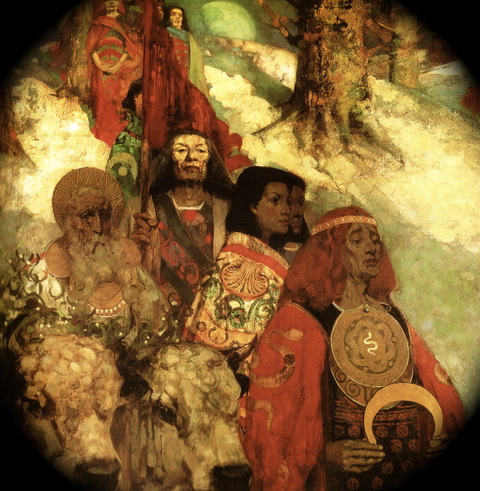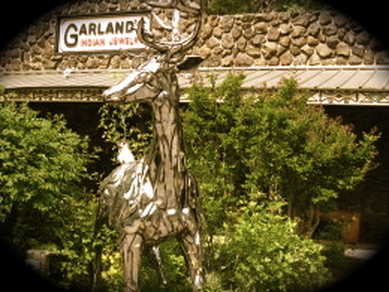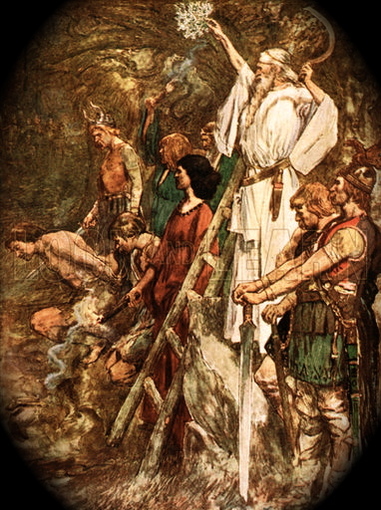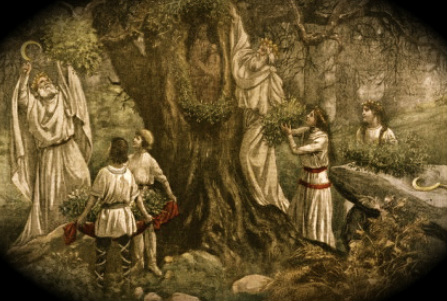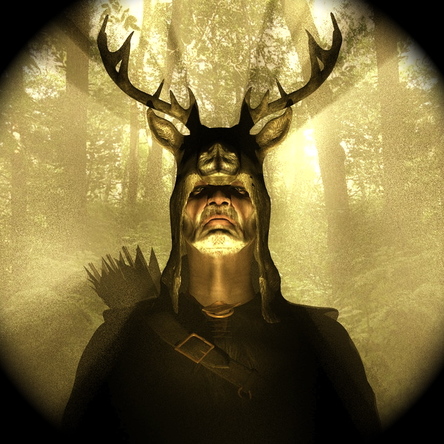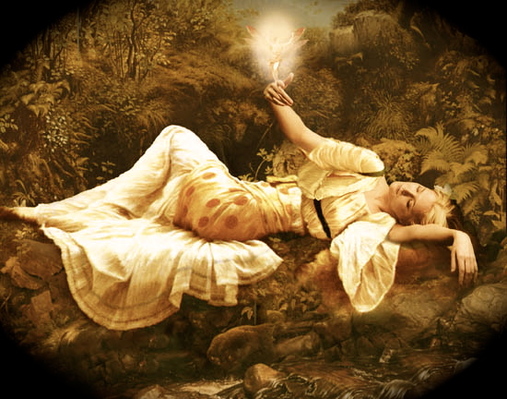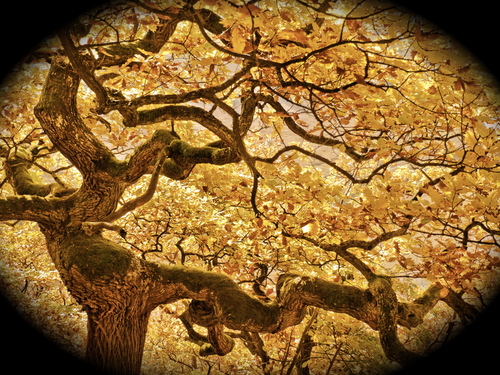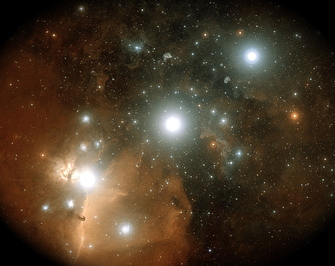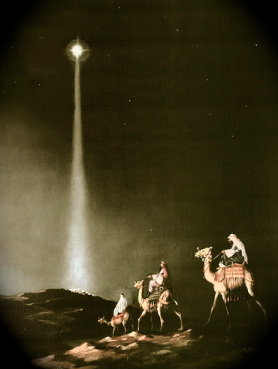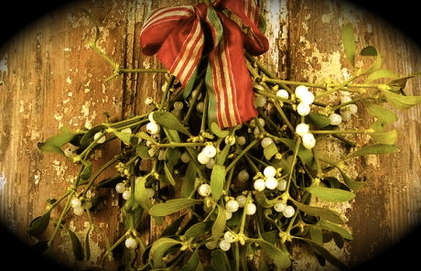DRUALAS
Mistletoe
The Riddle
I lived my life between the worlds
Neither earth nor sky would call me child
The birds were my companions
The wind and rain my mentors
Daily I grew in power and strength
Till snatched out of time by the trickster
[Answer: Mistletoe]
Many years ago when I lived in Sedona Arizona, I would visit what, for me, was the most sacred place there. It wasn’t one of the vortex points, of which there are many, it wasn’t either one of the places that held strong ancestral Native American energy, but instead a small grotto where three springs rose from the earth and pooled around a large red rock before meandering off on the long journey to the ocean.
This spot was down a dirt road called Old Indian Road, and although invisible from the main highway, 89a, it was marked almost magically by a restaurant opposite called Garlands that heralded a large silver stag out front that peered at the passers-by as they took their drive up to Flagstaff in Arizona.
The significance of the stag will become clear as I tell my story. Needless to say it marks the spot (to those in the know) where just across the road, behind a coded iron gate, across a small bridge and river, lies one of the most magical places I have ever known and a portal into Faerie.
I have had many magical experiences there, including the visitation of Herne himself, which occurred after deciphering a complex code from Robert Graves’ book, The White Goddess. I consider this book, within the bardic traditions, as one of the greatest magical texts ever written, which describes, if understood correctly, the invocation of the White Goddess herself, which is guaranted to occur after the highly complex riddle is garnered from its thick linguistic pages.
That story I will leave for another time, as for now I wish to talk of the magical significance of Mistletoe.
This spot was down a dirt road called Old Indian Road, and although invisible from the main highway, 89a, it was marked almost magically by a restaurant opposite called Garlands that heralded a large silver stag out front that peered at the passers-by as they took their drive up to Flagstaff in Arizona.
The significance of the stag will become clear as I tell my story. Needless to say it marks the spot (to those in the know) where just across the road, behind a coded iron gate, across a small bridge and river, lies one of the most magical places I have ever known and a portal into Faerie.
I have had many magical experiences there, including the visitation of Herne himself, which occurred after deciphering a complex code from Robert Graves’ book, The White Goddess. I consider this book, within the bardic traditions, as one of the greatest magical texts ever written, which describes, if understood correctly, the invocation of the White Goddess herself, which is guaranted to occur after the highly complex riddle is garnered from its thick linguistic pages.
That story I will leave for another time, as for now I wish to talk of the magical significance of Mistletoe.
For a long time I had known that it was considered the most sacred plant to the Druids but as is my way I had done no reading or study on this. I prefer to use books as a form of evidencia and confirmation on my many experiences rather than learning or acquiring intellectual knowledge, which of itself I believe to hold no true power or essence.
In writing this article however I have gone to a few sources of information to help describe better the significance of the experience I am about to describe.
It is written on The Order of Bards, Ovates and Druids website:
'From the land of timeless wonder, the land of promise, where all lived together in peace in a world of abundant beauty; there comes a guide, holding over his shoulder a branch, a branch that has growing upon it both flowers and fruit, a branch which sings healing and peace to all those who hear its song.
It is with this branch that the chosen hero of the tale can walk into the Otherworld to meet divine beings or find insight and understanding to bring back to the physical world and fulfil a destiny.
This branch, sometimes call the “Hero’s Bough” or the “Silver Branch” is considered magic and of another world, but we only need to look at the English Mistletoe (Viscum album) to find a plant that has both ripened fruit and pollinating blossom at the same time of the year. Is it that the branch of legend is our mistletoe?
Mistletoe stands alone in the kingdom of the plants.
· The only seed that germinates in the light, well it doesn’t germinate so much as wait for the vernal equinox then hatch.
· It is unaffected by the gravity of the earth.
· Constantly growing, this deciduous and evergreen woody shrub has no growth rings.
· Heals by poisoning'.
(Source: http://www.druidry.org/library/library/mistletoe-foundation)
In writing this article however I have gone to a few sources of information to help describe better the significance of the experience I am about to describe.
It is written on The Order of Bards, Ovates and Druids website:
'From the land of timeless wonder, the land of promise, where all lived together in peace in a world of abundant beauty; there comes a guide, holding over his shoulder a branch, a branch that has growing upon it both flowers and fruit, a branch which sings healing and peace to all those who hear its song.
It is with this branch that the chosen hero of the tale can walk into the Otherworld to meet divine beings or find insight and understanding to bring back to the physical world and fulfil a destiny.
This branch, sometimes call the “Hero’s Bough” or the “Silver Branch” is considered magic and of another world, but we only need to look at the English Mistletoe (Viscum album) to find a plant that has both ripened fruit and pollinating blossom at the same time of the year. Is it that the branch of legend is our mistletoe?
Mistletoe stands alone in the kingdom of the plants.
· The only seed that germinates in the light, well it doesn’t germinate so much as wait for the vernal equinox then hatch.
· It is unaffected by the gravity of the earth.
· Constantly growing, this deciduous and evergreen woody shrub has no growth rings.
· Heals by poisoning'.
(Source: http://www.druidry.org/library/library/mistletoe-foundation)
I had no idea of this information on that bright winter’s day when I walked down the dusty track to the sacred springs. The only thing I knew about Mistletoe, was that, whilst sacred to the druids, in modern times it was considered poisonous, especially its white milky berries.
'There are several species of mistletoe. The Phoradendron species contain a toxin called phoratoxin, which can cause blurred vision, nausea, abdominal pain, diarrhea, blood pressure changes, and even death. The Viscum species of mistletoe contain a slightly different cocktail of chemicals, including the poisonous alkaloid tyramine, which produce essential the same symptoms. Although mistletoe has therapeutic uses, eating any part of the plant (particularly the leaves or berries) or drinking a tea from the plant can result in sickness and possibly death. Unlike the holiday poinsettia, which has a bad reputation yet probably won't do more than make you feel sick if you eat it, mistletoe ingestion warrants a call to Poison Control and immediate medical attention'.
(Source: http://chemistry.about.com/od/christmaschemistry/f/mistletoe-toxicity.htm
'There are several species of mistletoe. The Phoradendron species contain a toxin called phoratoxin, which can cause blurred vision, nausea, abdominal pain, diarrhea, blood pressure changes, and even death. The Viscum species of mistletoe contain a slightly different cocktail of chemicals, including the poisonous alkaloid tyramine, which produce essential the same symptoms. Although mistletoe has therapeutic uses, eating any part of the plant (particularly the leaves or berries) or drinking a tea from the plant can result in sickness and possibly death. Unlike the holiday poinsettia, which has a bad reputation yet probably won't do more than make you feel sick if you eat it, mistletoe ingestion warrants a call to Poison Control and immediate medical attention'.
(Source: http://chemistry.about.com/od/christmaschemistry/f/mistletoe-toxicity.htm
I meandered off the dirt track and through the long grasses that lead to the spring. As I turned a corner there in front of me, lying in a golden ray of sunlight, in the middle of the large red boulder surrounded by spring water, was a sprig of mistletoe.
It must have fallen from one of the many over-hanging trees. I hopped, skipped and jumped across the rocks that protruded above the water, onto the large boulder and sat gazing at it.
Bearing in mind the very limited information I had at the time about mistletoe, I nonetheless saw this as a gift from the trees and, picking it up, held it in my hands.
Why, I thought, are you held in such high regard by my ancestors? I had been to this place at the springs many times before and had always felt a strong magical presence, acknowledging it as sacred to the Goddess, but on this day the light was different somehow, clearer, and the energy there more vibrant.
I slide down the rock to a piece of red stone that jutted out above the pristine clear waters and pondered whether I should digest this plant. Believing it to be poisonous, I said a small prayer to the All Mother and then plucked one leaf from the golden green twig and tentatively placed it in my mouth, still praying. My saliva engaged with the plant and I very slowly began to swallow its bitter juice.
In a moment I was transported through the veil and in to the devic realms and the land of Fay. I was still present, sat on the rock, but my consciousness was propelled forward into the landscape. I could see the magnetism of each plant and tree, and feel the vibrancy of their surrounding devic force.
Then through the brush the Guardian appeared to protect his kingdom. He materialised in the form of the Horned God, his stag horns twinkling with river dew and sunlight. In that moment I entered a state of complete ecstasy and bliss, my head felt illuminated with psychic force as I then passed through Him and into Her devic realm, my awareness slowly harmonised within Her kingdom as nature itself wrapped Her arms around me, Her presence and muse totally intoxicating my soul and from my lips spontaneously poured forth this poem.
It must have fallen from one of the many over-hanging trees. I hopped, skipped and jumped across the rocks that protruded above the water, onto the large boulder and sat gazing at it.
Bearing in mind the very limited information I had at the time about mistletoe, I nonetheless saw this as a gift from the trees and, picking it up, held it in my hands.
Why, I thought, are you held in such high regard by my ancestors? I had been to this place at the springs many times before and had always felt a strong magical presence, acknowledging it as sacred to the Goddess, but on this day the light was different somehow, clearer, and the energy there more vibrant.
I slide down the rock to a piece of red stone that jutted out above the pristine clear waters and pondered whether I should digest this plant. Believing it to be poisonous, I said a small prayer to the All Mother and then plucked one leaf from the golden green twig and tentatively placed it in my mouth, still praying. My saliva engaged with the plant and I very slowly began to swallow its bitter juice.
In a moment I was transported through the veil and in to the devic realms and the land of Fay. I was still present, sat on the rock, but my consciousness was propelled forward into the landscape. I could see the magnetism of each plant and tree, and feel the vibrancy of their surrounding devic force.
Then through the brush the Guardian appeared to protect his kingdom. He materialised in the form of the Horned God, his stag horns twinkling with river dew and sunlight. In that moment I entered a state of complete ecstasy and bliss, my head felt illuminated with psychic force as I then passed through Him and into Her devic realm, my awareness slowly harmonised within Her kingdom as nature itself wrapped Her arms around me, Her presence and muse totally intoxicating my soul and from my lips spontaneously poured forth this poem.
An Ode to Herne
Oh, to dream of Herne and the pleasures there in,
Lies a selkies dream of oak trees daubed in golden mistletoe.
Tales tell of sweet honey nectar,
Drawn from parasitic roots leaves and berries.
Mabon be the child,
That on the day of its kindling,
Be bathed thrice in the sacred pools of Annwn.
Harpies call to those such as these,
That ponder plant life and poetic in their searching,
Seek the gift of the Golden tongue.
Taliesin’s tempered telling, told of tales,
Twinkling in twilights tasting.
Amergin quelled with rosemary rhymes,
Of gifts to be taken,
With those who dare to dawdle down dingily dells,
Of dew drops dripping from the lips of the Queen of Fay.
You my Queen of all hearts seeking,
Who’s bed of pettaled pou porri pours pleasures on my thick skin.
You the Queen of summers game ,
Wild huntress of the morning.
Rise up from your Fairie fort and shower me in blessings.
Wide eyed wandering wonderers of willow trees winding their spindling vines,
Through nooks and crannies of old wives tales telling.
Deep into this sodden earth and boulders of basilled breads burnt backing,
Betrothing of their making.
Worms of wooded wild wilderness,
Intent on investigating.
Baal and Bacchus,Dionysius dreaming,
Arianrod, Hecate ,Demeter’s distant calling.
Lead us through this Devic dance onwards towards your dwelling
And there beside the Queen of Fay,
My bed lies for the making.
Lies a selkies dream of oak trees daubed in golden mistletoe.
Tales tell of sweet honey nectar,
Drawn from parasitic roots leaves and berries.
Mabon be the child,
That on the day of its kindling,
Be bathed thrice in the sacred pools of Annwn.
Harpies call to those such as these,
That ponder plant life and poetic in their searching,
Seek the gift of the Golden tongue.
Taliesin’s tempered telling, told of tales,
Twinkling in twilights tasting.
Amergin quelled with rosemary rhymes,
Of gifts to be taken,
With those who dare to dawdle down dingily dells,
Of dew drops dripping from the lips of the Queen of Fay.
You my Queen of all hearts seeking,
Who’s bed of pettaled pou porri pours pleasures on my thick skin.
You the Queen of summers game ,
Wild huntress of the morning.
Rise up from your Fairie fort and shower me in blessings.
Wide eyed wandering wonderers of willow trees winding their spindling vines,
Through nooks and crannies of old wives tales telling.
Deep into this sodden earth and boulders of basilled breads burnt backing,
Betrothing of their making.
Worms of wooded wild wilderness,
Intent on investigating.
Baal and Bacchus,Dionysius dreaming,
Arianrod, Hecate ,Demeter’s distant calling.
Lead us through this Devic dance onwards towards your dwelling
And there beside the Queen of Fay,
My bed lies for the making.
As these words flowed through me I was in a state of pure poetic bliss, yet as soon as they had sprouted from my lips, I began to panic, my mind crowded into this magical kingdom with its inevitable doubt and fear - Am I going insane? Will I ever be able to return from here? As the panic mounted I intuitively plucked another leaf from the mistletoe and placed it again in my mouth. In an instant I was shot back into my normal state of consciousness, back in my body on the red boulder. In some strange way, nature acknowledged this and withdrew its sunlight as a cloud passed overhead and I was left shivering, yet extremely exhilarated, from the experience.
In that moment I realised the magical significance of mistletoe, and why it was so important to the Druids and its bardic tradition - how it offers the gift of the golden tongue, the bardic muse - it being the sacred plant that facilitates a shift of consciousness in and out of the devic realms.
I understood instantly why the ancients treated it with such reverence.
In that moment I realised the magical significance of mistletoe, and why it was so important to the Druids and its bardic tradition - how it offers the gift of the golden tongue, the bardic muse - it being the sacred plant that facilitates a shift of consciousness in and out of the devic realms.
I understood instantly why the ancients treated it with such reverence.
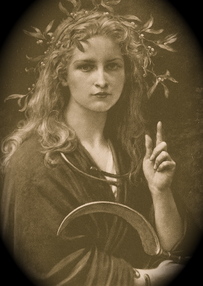
The Druids revered the oak above all other trees and it now made complete sense as to why the mistletoe upon its branches carried so much significance to them…
It is described by Pliny the Elder, writing in the 1st Century AD, that a religious ceremony in Gaul in which white-clad druids climbed a sacred oak, cut down the mistletoe growing on it, sacrificed two white bulls and used the mistletoe to cure infertility.
'The druids – that is what they call their magicians – hold nothing more sacred than the mistletoe and the tree on which it is growing, provided it is Valonia Oak.... Mistletoe is rare and when found it is gathered with great ceremony, and particularly on the sixth day of the moon.... Hailing the moon in a native word that means 'healing all things,' they prepare a ritual sacrifice and banquet beneath a tree and bring up two white bulls, whose horns are bound for the first time on this occasion. A priest arrayed in white vestments climbs the tree and, with a golden sickle, cuts down the mistletoe, which is caught in a white cloak. Then finally they kill the victims, praying to a god to render his gift propitious to those on whom he has bestowed it. They believe that mistletoe given in drink will impart fertility to any animal that is barren and that it is an antidote to all poisons'.
(Source: http://en.wikipedia.org/wiki/Ritual_of_oak_and_mistletoe)
Some modern scholars agree with the classical Roman and Greek authors that the most likely derivation for 'Druid' is from the word for oak, combined with the Indo-European root wid - to know, giving their translation of the word Druid as 'One with knowledge of the oak' or 'Wise person of the oak'. Those who possessed knowledge of the oak possessed knowledge of all the trees. The Druid was one with 'knowledge of the trees' and was a 'Forest Sage’.
(Source: http://www.druidry.org/library/library/mistletoe-foundation)
It is described by Pliny the Elder, writing in the 1st Century AD, that a religious ceremony in Gaul in which white-clad druids climbed a sacred oak, cut down the mistletoe growing on it, sacrificed two white bulls and used the mistletoe to cure infertility.
'The druids – that is what they call their magicians – hold nothing more sacred than the mistletoe and the tree on which it is growing, provided it is Valonia Oak.... Mistletoe is rare and when found it is gathered with great ceremony, and particularly on the sixth day of the moon.... Hailing the moon in a native word that means 'healing all things,' they prepare a ritual sacrifice and banquet beneath a tree and bring up two white bulls, whose horns are bound for the first time on this occasion. A priest arrayed in white vestments climbs the tree and, with a golden sickle, cuts down the mistletoe, which is caught in a white cloak. Then finally they kill the victims, praying to a god to render his gift propitious to those on whom he has bestowed it. They believe that mistletoe given in drink will impart fertility to any animal that is barren and that it is an antidote to all poisons'.
(Source: http://en.wikipedia.org/wiki/Ritual_of_oak_and_mistletoe)
Some modern scholars agree with the classical Roman and Greek authors that the most likely derivation for 'Druid' is from the word for oak, combined with the Indo-European root wid - to know, giving their translation of the word Druid as 'One with knowledge of the oak' or 'Wise person of the oak'. Those who possessed knowledge of the oak possessed knowledge of all the trees. The Druid was one with 'knowledge of the trees' and was a 'Forest Sage’.
(Source: http://www.druidry.org/library/library/mistletoe-foundation)
The Mistletoe being parasitic and drawing its essence from the Oak must, in turn, have passed its wisdom onto the Druids, which I assume, they ceremonially consumed.
Which brings me to another realisation, that of the poetic muse.
In 1694, the Welsh poet Henry Vaughan wrote to his cousin, the antiquary John Aubrey, in response to a request for some information about the remnants of Druidry in existence in Wales at that time, saying:
'The antient Bards… communicated nothing of their knowledge, but by way of tradition: which I suppose to be the reason that we have no account left nor any sort of remains, or other monuments of their learning of way of living. As to the later Bards, you shall have a most curious account of them. This vein of poetrie they called Awen, which in their language signifies rapture, or a poetic furore and (in truth) as many of them as I have conversed with are (as I may say) gifted or inspired with it'.
(Source: http://en.wikipedia.org/wiki/Awen)
It is this poetic furore that is held in such high regard within the druidic system of worship and magic. It was the true bard’s vocation, not only to gather sacred wisdom through song, tongue and memory but, most importantly, that the words themselves worked as summoning spells of the God/Goddess, invoking their power and presence through the incantation of triadic rhymes.
This brings me to my next and possibly most important point, in reference to what is known by the Druids as the Awen and its three rays of power, and how this information may be used by the reader in a modern context.
'Various Neo-Druidic groups and individuals have their own interpretation of the Awen. The three lines relate to earth, sea and air; body, mind and spirit; or love, wisdom and truth. It is also said that the Awen stands for not simply inspiration, but for inspiration of truth; without Awen one cannot proclaim truth. The three foundations of Awen are the understanding of truth, the love of truth, and the maintaining of truth'.
(Source: http://en.wikipedia.org/wiki/Awen)
Which brings me to another realisation, that of the poetic muse.
In 1694, the Welsh poet Henry Vaughan wrote to his cousin, the antiquary John Aubrey, in response to a request for some information about the remnants of Druidry in existence in Wales at that time, saying:
'The antient Bards… communicated nothing of their knowledge, but by way of tradition: which I suppose to be the reason that we have no account left nor any sort of remains, or other monuments of their learning of way of living. As to the later Bards, you shall have a most curious account of them. This vein of poetrie they called Awen, which in their language signifies rapture, or a poetic furore and (in truth) as many of them as I have conversed with are (as I may say) gifted or inspired with it'.
(Source: http://en.wikipedia.org/wiki/Awen)
It is this poetic furore that is held in such high regard within the druidic system of worship and magic. It was the true bard’s vocation, not only to gather sacred wisdom through song, tongue and memory but, most importantly, that the words themselves worked as summoning spells of the God/Goddess, invoking their power and presence through the incantation of triadic rhymes.
This brings me to my next and possibly most important point, in reference to what is known by the Druids as the Awen and its three rays of power, and how this information may be used by the reader in a modern context.
'Various Neo-Druidic groups and individuals have their own interpretation of the Awen. The three lines relate to earth, sea and air; body, mind and spirit; or love, wisdom and truth. It is also said that the Awen stands for not simply inspiration, but for inspiration of truth; without Awen one cannot proclaim truth. The three foundations of Awen are the understanding of truth, the love of truth, and the maintaining of truth'.
(Source: http://en.wikipedia.org/wiki/Awen)
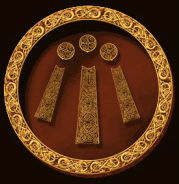
The 6th day of the New year is the day when, many years past, our ancestors would have gathered the Mistletoe from the sacred oak. This very same day is also called Three Kings Day. It is the day that celebrates the Magi {the three wise men} who brought three symbolic gifts to the Christ Child. These gifts were gold, frankincense, and myrrh. The gift of gold is said to be associated with the sun and heavenly rulership, as well as kingship on Earth. The gift of frankincense is an aromatic resin that has been used in temples and religious rites for centuries as a symbol of priesthood and divinity. The gift of myrrh was said to symbolise mortality and death because of its use as an embalming oil, and for that very same reason was also associated with the rebirthing spirit.
This triadic force echoes that of the Awen, which heralds for us the acknowledgment of our Muse, presence and power in the world, and recognition of our hidden gifts, much as the Christ was witnessed by the three wise men.
This mythos echoes back through time, not just to the Druids, but back to ancient Egypt and Osiris whose coming was announced by Three Wise Men: the three stars Mintaka, Anilam, and Alnitak in the belt of Orion, which point directly to Osiris's star in the east, Sirius (Sothis), significator of his birth.
This triadic force echoes that of the Awen, which heralds for us the acknowledgment of our Muse, presence and power in the world, and recognition of our hidden gifts, much as the Christ was witnessed by the three wise men.
This mythos echoes back through time, not just to the Druids, but back to ancient Egypt and Osiris whose coming was announced by Three Wise Men: the three stars Mintaka, Anilam, and Alnitak in the belt of Orion, which point directly to Osiris's star in the east, Sirius (Sothis), significator of his birth.
This heavenly theme is obviously astrological and astrotheological in nature, dating back centuries to millennia prior to the common era. The Bright Star and The Three Kings represent motifs that long predate Christianity. They symbolise the star Sirius as well as those of Orion’s Belt, again representing the repeated triplet.
My very simple suggestions for this Jan 6th, the last day of Christ mass, are either you find a tree in the woods on which Mistletoe {Viscum album} is growing, and after making a small offering, pluck some from its branches making sure it doesn’t touch the ground, then pray fervently before digesting a single leaf. Or that you take a leaf of mistletoe from a branch in your house (that maybe you kissed under on New Year’s Eve), and take yourself off to a quiet and special place in nature, call out a prayer of thanks and summoning the Old Ones, place a single golden green leaf inside your mouth and gently begin to absorb its magical essence so that by morning you too may be blessed with the gift of the golden tongue.
I believe any person genuinely drawn to these bardic traditions should gather and harvest this most sacred of plants the Mistletoe and carry it with them. Not just as a token of commitement to the White Goddess but as a magical allie, to help create poetic bardic bridges between this world and the next.
I believe any person genuinely drawn to these bardic traditions should gather and harvest this most sacred of plants the Mistletoe and carry it with them. Not just as a token of commitement to the White Goddess but as a magical allie, to help create poetic bardic bridges between this world and the next.
